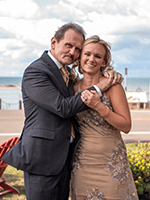The Challenge: Biliary Cirrhosis
As a DEA agent, Frank had led a healthy, active life. But after he was diagnosed with biliary cirrhosis, an autoimmune disease that causes damage to the bile ducts and liver, he spent a decade in and out of the hospital with complications. The disease took a serious toll on his health.
In 2015, he hit rock bottom when he had a major episode at his youngest daughter’s soccer scholarship ceremony. Leaving the ceremony, his family rushed to the hospital. They were used to spending time in hospital rooms, but this time Frank was in the ICU. His condition was much more serious than ever before.
His oldest daughter, Erica, had an especially hard time coping with her father’s condition because of her training as a nurse. She felt the added burden of having a deep understanding of the danger her father was in.
“When you know too much, you’re more scared. Like this is not good, it’s life-threatening, but I didn’t want to scare my family,” Erica said.
During Frank’s time in the hospital, he learned that if he wanted to survive, he would need a liver transplant. Believing that his chances of getting a deceased-donor liver were small, he prepared for the worst by writing a goodbye letter to each member of his family.
The Path to Living Donation at UPMC
After a conversation with one of his doctors, Frank learned about living-donor liver transplant. Living-donor liver transplant would allow Frank to receive the transplant he needed sooner, if he could identify a suitable living donor. Erica immediately offered to be evaluated, but Frank said no. He couldn’t imagine asking a family member to go through surgery and recovery for him. In fact, he was hesitant to search for a living donor at all.
Still unsure, Frank and his wife Debbie attended a Living Donor Champion Workshop at UPMC. They learned about the living donation process, the benefits of living donor transplant, and how to find a living donor.
“Don’t be afraid to ask was the main thing they stressed,” Frank said, “which was what I wasn’t doing.”
It was the Champion Workshop that changed Frank’s mind, opening him up to the possibility of living donation. But it was Debbie who really encouraged him to pursue living donation, acting as his Champion. She even sat down with their three kids to talk about the situation, and all three said they would be evaluated. Erica decided to be evaluated first.
“She told me she was going to do it. She didn’t give me an option, she just said she would,” Frank said.
The Solution: A Daughter Saves Her Father
Erica went through the extensive evaluation process and found out she was a suitable donor. There wasn’t a doubt in her mind that she would donate a portion of her liver to her dad.
“I just felt like, this is it. It’s either this or he dies. There was no other option at that point,” Erica said.
The morning of Oct. 23, 2017, Frank and Erica arrived at the hospital for their living-donor liver transplant. The entire Drew family sat silently with them in the waiting room, anxiously preparing themselves for hours of waiting.
“We said goodbye just before the surgery. But I think it was harder on everybody else around us,” Erica said.
That day, they underwent a successful transplant.
The Results:
“You look at pictures of him before the surgery and he looked sick,” Erica said. “We saw him every day and didn’t think about it, but looking back, he was really sick.” But today, Frank is healthier than he has been in 15 years. With their father healthy again, the Drew family is incredibly grateful and dedicated to spreading awareness of living donation.
“If you have questions, look into it. Don’t wait like I did. When you’re diagnosed, learn about it quickly and don’t be afraid to ask anybody,” Frank said.
No longer worried about Frank’s health, Erica and her husband have given birth to a baby girl, a family member she didn’t think her father would ever get the chance to meet. Frank is extremely thankful not just to be alive but to be healthy, for a new grandchild. At this time the year before, Erica had been too focused on saving her dad’s life to think this was even a possibility.
“There’s a light at the end of the tunnel,” Erica said. “We’ve been there, having a sick loved one, but there’s hope. I felt like this is what I was supposed to do, to keep my dad alive.”

















